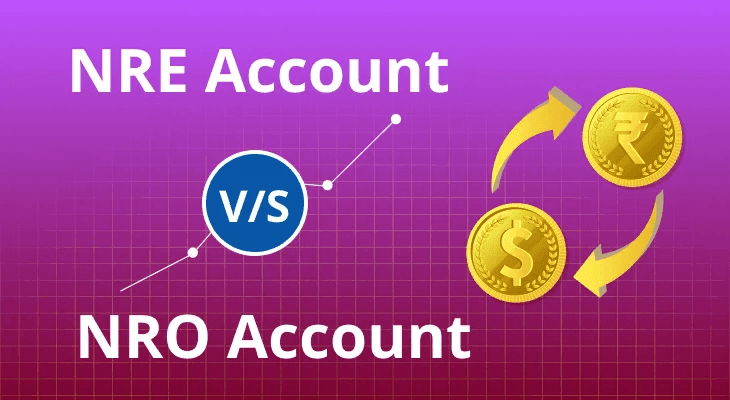Non Resident External (NRE) and Non-Resident Ordinary Rupee accounts are two kinds of bank accounts that concern NRIs or Non Resident Indians. They are extremely essential for you on a legal note in case you are an NRI.
According to Indian laws, specifically, Foreign Exchange Management Act (Fema), does not allow you to park your money in regular resident savings account in India once you have achieved the NRI status.

Are you an NRI?
Before you answer your NRE vs NRO dilemma let’s first understand the definition of NRI. It becomes extremely important to know your NRI status before you even know if you need an NRE or NRO account or not because the definition of who is an NRI is different under Fema ACT and under Income Tax Act (ITA)
Who is an NRI under Fema:
NRI as per Fema is a person who is a resident outside India but is a citizen of India.
Who is an NRI under ITA
Persons who have been in India for 120 days or less OR he/she is in India for a period of 60 days or less even after completing 365 days in the preceding four years.
Therefore, NRIs include those individuals who visited India for less than 120 days in a financial year.
This amendment was brought in the financial year (FY20-21). Earlier the 120-day threshold was 182 days. However, there is a catch here.
If the total Indian income, that is the income accruing in India, during the financial year is more than Rs 15 lakh, only then the 120 days rule will apply. Visiting NRIs whose total taxable income in India is up to Rs 15 lakh during the financial year, will continue to remain NRIs only if their stay does not exceed 181 days, as was the case earlier.
Why do we have NRE & NRO Accounts
As per the Foreign Exchange Management Act (FEMA) guidelines, an NRI cannot have a savings account in his or her name in India. You must convert all your savings (money earned abroad) to a Non-Resident External Account (NRE) or Non-Resident Ordinary (NRO) account. Therefore, continuing to use the savings account in the home country can attract hefty penalties. Opening an NRE or NRO account is, hence, a viable option for Non-Resident Indians. It can help NRIs in two ways. One, they can send their foreign earnings to India at any point. Two, they can also retain their income from India (via any assets) in the home country itself.
Add Your Heading Text HerAWhat is a Non-Resident Rupee (NRE) Accounte
The NRE account is an Indian rupee-denominated account, offering complete security. These accounts can be in the form of savings, current, recurring, or fixed deposits. The foreign currency you deposit into the account is converted to INR. You can also transfer your funds (Principal & Interest amount) to a foreign account from an NRE account without any complications and restrictions. You need to note that the amount you deposit into these accounts must be earned outside India. The international debit card enables you to transact and withdraw money 24*7. Also, mutual fund investments to become effortless and instant if you link your NRE account number to the investment account. NRE account is primarily used for carrying out business, personal banking and making investments in India.
What is a Non-Resident Ordinary Rupee (NRO) Account
An NRO account is a savings or current account held by NRIs in India to manage their income earned in India. Account-holders can deposit and manage their accumulated rupee funds without any hassle. The account allows you to receive funds in Indian or Foreign currency. You can apply for an NRO account jointly with a resident Indian or even an NRI. It is even feasible to transfer money from your current NRE account.
NRE vs NRO Account
| Sr. No. | NRE | NRO | |
| 1. | Definition | Non-Resident External (NRE) Accounts are to deposit for overseas earnings | Non-Resident Ordinary Rupee (NRO) Accounts are for depositing income earned in India |
| 2. | Denomination | Indian Rupee. This means your foreign currency savings are converted both during deposit and withdrawal. | Indian Rupee |
| 3. | Foreign Currency Risk | Yes | No |
| 4. | Tax | Exempt. Both principal and interest. | Interest paid to an NRI will be taxed at 30% excluding surcharges. |
| 5. | Minimum Balance | Up to Rs 10,000 | Up to Rs 10,000 |
| 6. | Joint Account | With residents or NRIs | With residents or NRIs |
| 7. | Repatriability | Funds are completely and freely repatriable | Here repatriability is subject to taxes and only $1 Million in a single financial year is allowed |
| 8. | Deposit Rules | Indian income cannot be deposited here | Overseas income cannot be deposited |
| 9. | Deposit and Withdrawal Currency | Can deposit in foreign currency and withdraw in Rupee | Both to be in Indian rupee denomination |
FAQs
Who can open NRE and NRO account?
Both NRIs (Non-Resident Indians) and PIOs (Persons of Indian Origin) can open NRE and NRO accounts.
What is the taxable limit of NRO account?
For an NRO account, the interest earned on the account balance is subject to income tax. The taxable limit depends on the individual’s income slab and the prevailing tax laws in India.